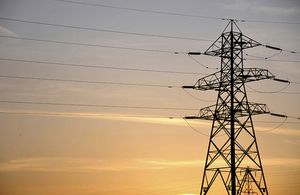Energy market investigation: CMA publishes issues statement
The Competition and Markets Authority (CMA) has published an issues statement as part of its investigation into the GB energy market.

Energy-pylon
The issues statement sets out the scope of the investigation. It outlines initial theories on what might be adversely affecting competition and what the resulting effects could be for customers but does not imply that the Investigation Group has yet identified any competition concerns.
These are intended as topics for investigation and are not views, let alone findings or conclusions. The purpose is to help those submitting evidence to focus on the issues that will be investigated and to also seek views on whether these issues have been identified correctly.
Roger Witcomb, Chair of the Energy Market Investigation Group, said:
Given the importance of energy supply to households, businesses and the economy, we very much encourage submissions on the issues we have identified and whether these cover the areas we need to investigate.
We are looking to identify the underlying causes, at both wholesale and retail level, which could be leading to the widespread concerns that have surrounded this market in recent years - including rising energy bills, service quality, profitability and uncertainty over future investment.
This is a market which is very complex so it is important at an early stage to focus the investigation on the most relevant issues.
Ofgem announced its decision to refer last month and the CMA is now carrying out its own comprehensive, independent investigation to see if there are any features of this market which prevent, restrict or distort competition and, if so, what action might be taken to remedy them. (For more information on market investigation references see the CMA’s ).
The CMA is required to publish its final report by 25 December 2015 and has set out a timetable setting out a schedule for the various stages of the investigation.
The CMA has also now appointed independent panel members to the Investigation Group (see notes to editors). The appointed Investigation Group act as the decision makers and have been chosen from the CMA’s panel members, who come from a variety of backgrounds, including economics, law, accountancy and business.
All information relating to the investigation will be available on the energy market case page. Submissions in response to the issues statement are invited in writing by 14 August 2014 either by e-mail to energymarket@cma.gsi.gov.uk or to:
Project Manager
Energy market investigation
Competition and Markets Authority
Victoria House
Southampton Row
London WC1A 4AD
Notes for editors
- The CMA is the UK’s primary competition and consumer authority. It is an independent non-ministerial government department with responsibility for carrying out investigations into mergers, markets and the regulated industries and enforcing competition and consumer law. From 1 April 2014 it took over the functions of the Competition Commission and the competition and certain consumer functions of the Office of Fair Trading under the Enterprise Act 2002, as amended by the Enterprise and Regulatory Reform Act 2013. For more information see the CMA’s homepage on GOV.UK.
- Ofgem’s decision to refer the market followed a joint assessment of competition in the energy market, carried out by Ofgem, the Office of Fair Trading and the CMA.
- The members of the Energy Market Investigation Group are: Roger Witcomb (Chairman), Lesley Ainsworth, Martin Cave, Malcolm Nicholson and Robert Spedding.
- In its investigation, the CMA is required to decide whether ‘any feature, or combination of features, of each relevant market prevents, restricts or distorts competition in connection with the supply or acquisition of any goods or services in the United Kingdom or a part of the United Kingdom’. If so, then there is an adverse effect on competition and the CMA will also consider whether this is resulting in a detrimental effect on customers such as higher prices, lower quality or less choice of goods or services. The CMA will then decide whether it should introduce remedies to tackle the adverse effect on competition or detrimental effect on customers so far as it has resulted from, or may be expected to result from, that adverse effect on competition, or whether it should recommend action be taken by other bodies to remedy the adverse effects on competition, and if so, what action should be taken. If the CMA finds that there is no adverse effect on competition, the question of remedies will not arise.
- For CMA updates, follow us on Twitter @CMAgovuk, Flickr and LinkedIn.
- Enquiries should be directed to Rory Taylor on 020 3738 6798.